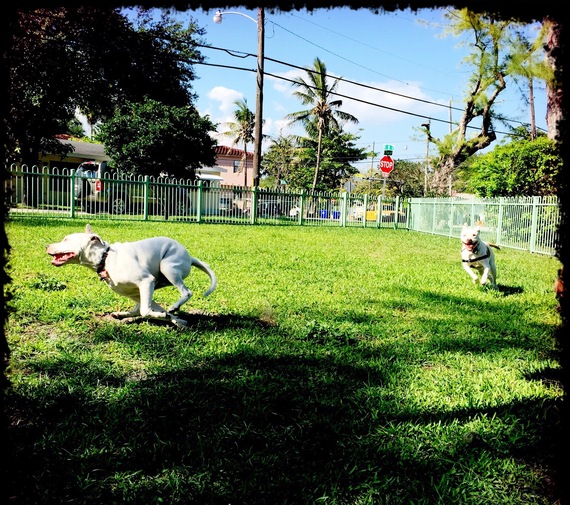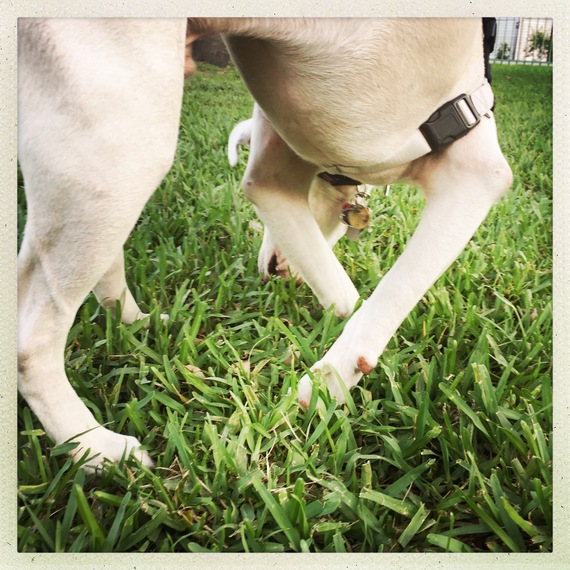I recently quit my 9-5. After many years working for an animal shelter, I resigned from my position. There was no bad blood, I was not burned out and I was not suffering from compassion fatigue. I was handed an opportunity that makes more sense for me and my family, so I jumped.
This has been a big transition and, during the process, I've been reflecting on the many things I learned from working in animal welfare, what those countless hours meant to me and what changes I think need to be made in the animal welfare community. Though the lessons are numerous and broad, I've been thinking a lot of about one particular subject: judgement.
Today, I'm sharing five things I learned during my time working for a private, not-for-profit shelter where animals were, generally speaking, free from the threat of euthanasia. When I use the term "animal welfare", I mean it to include municipal animal controls, non-profit shelters, private rescue groups of all sizes and sanctuaries. Nowhere do I use the words "kill shelter" or "no kill", and I never will. Those terms are not honest or factual, they are frequently misunderstood and they are dripping with contempt.
Stop Judging People! (News Flash! There ARE some very good reasons to surrender a pet!)
Yes, there are some very bad reasons to surrender an animal to a shelter and I could write a whole article on this alone, but there are also some very good reasons as well. Despite the best laid plans, life is unpredictable and sometimes bad things happen to good dogs (and their people).
I have comforted grown men, crying, almost hysterically so, because he had to leave his dog. I have met women living in domestic abuse shelters that would not let her live there- her one chance at physical and emotional safety- unless she rehomed her cat. These are good people in the midst of terrible situations. They are grieving their own loss and they feel guilty because their best friend does not understand what is happening or why.
The act of surrendering and being surrendered is a traumatic experience and it requires some grace and humanity on our part. I can't imagine what this feels like and, knock wood, I never will. Sometimes, people have to make terrible decisions and yes, sometimes it is in the animal's best interest to be surrendered to a shelter. The truth isn't always warm and fuzzy. Sometimes, it just plain sucks.
Please, Stop Judging Animal Control Agencies
Within the maze of county animal control agencies, private not-for-profit animal shelters, rescue organizations, private individuals working alone and sanctuaries that exist in most areas of this country, there is frequently a certain level of distrust of each other. Each organization believes that their approach is the best solution, that the others are corrupt or hoarders or liars or murders or crazy people who don't know the limits of how many animals they can help.
The open-admit, government-funded shelters are mandated to take in any animal that comes through the door, despite a pittance of a budget and very few resources to work towards successful adoptions. Many have created large-scale foster care, transfer and pet-retention programs, but when options have been exhausted and space has been filled, euthanasia must be considered.
These are good people making tough decisions and they don't like the outcomes anymore than their critics. They did not create this mess; rather, they are tasked with fixing a problem of epidemic proportions with little to no resources, and so many of us in the animal community are picketing and public-shaming and screaming "murderer!" from the top of our lungs.
Seriously, Stop Judging Limited-Admit Shelters!
Many in our communities misunderstand what a limited-admit shelter is. Many people call them "no-kill", which is inaccurate. Generally speaking, they take in animals that they have space for and that they feel they can find homes for. When space fills up, they close intake. It sucks but it's called math.
If you have 50 rooms and 50 cages, you can only humanely house a specific number of animals. But as much as it is simple math, it is also a much more complex equation that involves an assessment of the size of the dogs, the size of the rooms, the behavior of the individuals animals and their medical and socialization needs.
Limited-admit shelters also develop comprehensive foster care programs, implement enrichment and behavioral modification programs (if financial resources allow) and even forge transport relationships with other organizations with similar missions and policies.
These not-for-profits are also strapped for money and depend on adoption fees and donations to keep the animals fed, provide medical care and keep the doors open. They are doing the best that they can with what resources and community support they have.
To accomplish these lofty goals humanely, their intake procedures must be slow and controlled. You typically can't just drop off a stray animal or even your own pet. Call ahead. Ask about the intake procedures. Be patient. They are doing the best they can to help as many animals as possible, but sometimes the answer is going to be, "Yes, but not today'" or "No, but here are some other resources for you."
If You Really Want to Help The Animals, Stop Judging Private Rescues!
Private rescue groups are doing important work. They often step in when animal control and not-for-profit shelters can't help an animal. Rescues are almost always entirely foster-based organizations that have even less resources available than shelters. We are talking about a group of individuals who walk the talk when it comes to helping homeless animals.
Though there are some completely irresponsible rescue organizations that toe the line of hoarder, there are very many responsible, reputable rescues that do right by the animals in their care. We cannot judge all rescues by a few crazypants who are working from a place of how they feel about an animal's situation rather than what is in the best interest of the animal- and these are two entirely different things.
I can name a couple dozen responsible rescue organizations in my area off the top of my head. They understand the limits of how many animals they can humanely take in, they provide medical care for their animals and they organize public adoption events to showcase the animals that need homes. I will tell you that, in my experience, a responsible rescue organization has been designated as a 501(c)(3) and is registered with state or local governments when applicable and they are registered as authorized organizations that can pull from municipal animal controls. These are few things I personally think are hallmark indicators that a rescue organization is reputable and responsible. It's not fool-proof to be sure, but it is a good criteria to start from when evaluating a rescue organization.
For God's Sake, Please STOP Judging People Who Want to Adopt!
With 7.6 million homeless dogs and cats in the United States alone, we need to stop erecting unnecessary barriers to adoptions! We need to stop judging a family's fitness to care for an animal based on income alone, or if the neighborhood they live in does not meet our own personal standards, or if they are first-time pet parents or if they have the wrong color skin or if they do not have a perfect pet history.
I am a veterinary technician, my family earns a livable wage and my animals are all current on vaccines and preventative care. I am a pet blogger who is a huge advocate for deaf dogs and I work to educate pet parents on proper care, nutrition and socialization of their pets. Each of my dogs is trained and extremely well-behaved, and I would be denied by many not-for-profit shelters and rescue organizations. My pet history is not perfect. I work (egads!) 8-9 hours a day while my husband travels for weeks at a time. My backyard is fenced but my front one is not.
I personally know adoption counselors, both staff and volunteers, who are fantastic pet parents, who, based on an adoption application alone, would deny themselves as adopters. They would deem themselves unfit to provide a loving, safe home. This makes me want to scream.
One part of the adoption process needs to be educating people- on the specific animal they want to adopt, on what kind of medical care will be needed, on keeping the dog safe, on the importance of basic obedience training, and the list goes on.
I love the animal welfare community and am still a part of it. None of this is an indictment. Rather, it is meant as a call to action to educate ourselves and community, to forge partnerships with each other and to focus our energy on what is in the best interest of the homeless animal before us.
To me, the guiding question for every single interaction with every animal in our collective care needs to be, "What do you need from me right now?"





